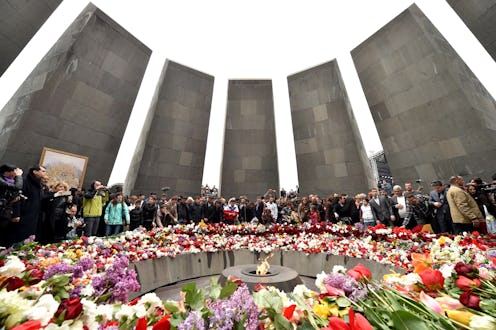News
Who Acknowledges the Armenian Genocide?
On Friday, people across Armenia commemorated the 100th anniversary of the mass killings of Armenians by Ottoman Turks in 1915. The killings — which occurred during WWI as the vast Ottoman Empire crumbled — have now been recognized by many historians and world leaders, both political and religious, as the first genocide of the 20th century. The use of the word genocide corroborates Armenia’s version of events: that the Ottoman government brutally and systematically exterminated 1.5 million ethnic Armenians in what is now modern day Turkey. Turkey has consistently rejected the word “genocide,” and it’s not the only country to do so.
In the Armenian capital Yerevan on Friday, grey skies hung over the Tsitsernakaberd Memorial Complex — the country’s major monument to those killed — as Armenian officials and international delegations assembled to pay their respects. President Vladimir V. Putin of Russia and President François Hollande of France were in attendance, The New York Times reports, as President Serzh Sargsyan of Armenia gave a speech that laid out the Armenian case.
“The western part of the Armenian people, who for millenniums had lived in their homeland, in the cradle of their civilization, were displaced and annihilated under a state-devised plan,” President Sargsyan said, “with direct participation of the army, police, other state institutions, and gangs comprising criminals released from the prisons specifically for this purpose.”
France and Russia are among the countries that recognize, fully, that the killings comprised a ruthlessly planned, and efficiently executed genocide. In a debate Friday, Germany, too, took a step towards ratifying the use of the word. The German parliament has set in motion the adoption of a resolution that labels the massacres a genocide. Although not finalized, President Joachim Gauck indicated the measure’s excellent chances when he used the word “genocide” officially for the first time to describe the killings. At a service in Berlin, Gauck said, “In this case we Germans must come to terms with the past regarding our shared responsibility, possibly shared guilt, for the genocide against the Armenians.”
The move comes after Pope Francis denounced the killings as the 20th century’s first genocide earlier in April. “Concealing or denying evil is like allowing a wound to keep bleeding without bandaging it,” Francis announced at the beginning of a special mass at the Vatican to mark the centenary of the killings. And yet, as veteran Middle East correspondent Robert Fisk writes, this “deliberate and planned attempt to liquidate a race of people” has actually been fully acknowledged by very few countries — around 20 parliaments out of a global total of 196. These countries include Canada, Chile, Argentina, Italy, Greece, and Sweden.
According to Article Two of the UN Convention on Genocide (signed on December 1948), genocide signifies the carrying out acts intended “to destroy, in whole or in part, a national, ethnic, racial or religious group.” Turkey, a key NATO ally, has never accepted that the killings were genocide, and the dispute has cast a long shadow over the relations between the neighbouring countries. The Turkish government maintains that only around 300,000 Armenians were killed, and that those who died were casualties of the chaos of war.
Although Turkey’s now-President Recep Tayyip Erdogan offered his condolences to the victims’ families in 2014 — a historic gesture of reconciliation — the Turkish government is no closer to accepting the killings as genocide. Earlier this month, when the European Parliament recognized the massacre as genocide, Turkish PM Ahmet Davutoglu lashed out in response. Davutoglu denounced the decision as a form of “discrimination.” Focusing on Armenian deaths, he claimed, ignored the fact that many “Turkish and Muslim Ottomans” also died during the First World War.
This refusal to recognise the killings as systematic is — in the eyes of many — ratified by President Barack Obama’s approach to the issue. The U.S. leader declined to use the word “genocide” in his address to mark the anniversary, as the White House had confirmed earlier this month. No matter his personal opinion, Obama is constrained by strong diplomatic ties with Turkey — a NATO ally and currently a key regional partner in dealing with the crises unfolding in Syria and Iraq.
Armenian-American leaders, vocal in the fight for recognition, registered their disappointment at Obama’s omission. “This is a betrayal of the truth, a betrayal of trust, a disgraceful national surrender to a foreign gag order being imposed by the government of Turkey,” Aram Hamparian, executive director of the Armenian National Committee of America, said at the time. Painful personal testimonies and harrowing photographs of the massacres make it hard to believe that there is still no general agreement on the issue.
Although commemoration ceremonies were held in Turkey for the victims Friday, the Times reports that the country also seemed intent on providing distractions. The commemoration of the Battle of Gallipoli (an event of great importance to Australia and New Zealand) was inexplicably brought forward by a day, from its usual date of April 25.
Relations between Turkey and Armenia are strained, and the border between the countries remains closed. In 1914, approximately 2 million Armenians lived in the eastern reaches of what is now Turkey. By 1922, only 400,000 remained — and the physical remnants of their existence have slowly fallen into ruin.
Images: Getty Images (4)
